‘Kill or be killed:’ Inside the mad world of Matthew Judon
The sport's under attack. The Patriots are at a crossroads. There’s hope in this predator who drags chumps into his own dimension. “For those 60 minutes?" he says. "I don’t give a f--k about you.”
FOXBOROUGH, Mass. — The dichotomy is infuriating. Pro football has entered a bizarro world where the job description of its work force clashes directly with the league’s corporate mission. Many people in suits spend many hours in boardrooms discussing ways to sell an inherently dangerous sport as… wait for it… safe.
The task is disingenuous, of course, and threatens the sport itself.
In the long term, this is a league trying to get kids hooked on its product and the only way to get those six- and seven-year-olds hooked is if a key demographic — the Mothers of America — are under the impression that Little Johnny won’t suffer an injury. Thus, the league refuses to look in the mirror and own its inherent violence. Those suits in charge dip the sport into a pool of Purell, implementing rules on rules on rules that make no sense. And there’s a cost: Every time a blasphemous flag is thrown — accompanied by a hefty fine — the psyche of a defensive player devolves. That player becomes a tick more docile. The shift isn’t sudden, rather tectonic. Gradual. Even if we don’t see a radical change, rest assured, football is softening. More defensive players subconsciously hesitate at the point of contact by a split-second because nobody enjoys lighting thousands of dollars on fire.
Those split-seconds add up and, now, our grandfathers aren’t the only ones shouting that touch football is around the corner.
Violence is being siphoned out of the sport. The NFL seeks a utopian middle ground that does not exist. When 4.3 speed and 245-pounders with 7 percent body fat collide at all conceivable angles, when adrenaline serves as oxygen, it’s impossible to ask players to stop. To think about their actions. To fill out all necessary mental paperwork. Football’s a beautiful sport ripe with — gasp! — toxic masculinity. It’s unequivocally true that grown men who bash into other grown men for a living must ooze with toxicity to thrive, to survive. If this sounds harsh, well, grab a tissue.
In the short term, softening the sport aligns with our ridiculous times. The NFL’s no different than all other multibillion dollar corporations that live in fear of what an ornery, easily-offended 22-year-old complains about on the bird app. All language around the sport itself — coaches, players, media — is carefully moisturized, lest we make anyone feel uncomfortable. Star players rarely speak with any venom, any shred of vengeance because they’re reprimanded in real time. Honesty leads to a torrent of backlash and, like clockwork, that player backpedals at the speed of light.
What a shame.
Nobody’s calling for the maiming of receivers 70s-style but the game’s overcorrection has reached the point of absurdity. Those brilliant powers that be don’t even allow players to point — point! — at each other after plays. That’s now “taunting.” Like it or not, there will be a lot of testosterone in football. And injuries. And emotions. This is a tough sport played by tough people. Football is not for everyone and, guess what? That’s OK! That’s why millions upon millions tune in and NFL ratings smash World Cup ratings. Pro football players are as close as American society has to modern-day gladiators.
Which is why Go Long hit the I-90 to Foxborough. Inside the bowels of Gillette Stadium, you’ll find one such gladiator who serves as hope for football mankind: New England Patriots’ ass-kicker, Matthew Judon.
This a man who understands the sport to its core.
“You’ve got to be yourself,” Judon says. “I believe if you’re loud, you should be loud. If you’re quiet, you should be quiet. If you talk trash, talk trash. Whatever got you here, continue to do that. There’s arrogance in rushing the passer and thinking you’re going to beat somebody. To sack their best player. You’ve got to have some arrogance. This isn’t an ‘Uh-oh, excuse me, pardon me’-type of job. This is, ‘I’m running through somebody’s face. I’m going to beat him. I’m the better man.’ Once the whistle blows, once it’s 0:00, that’s why we all meet in the middle of the field and pay each other’s respects. … But for those 60 minutes? Man, I don’t give a f--k about you. I don’t care nothing about you for those 60 minutes. It’s all about the people who wear the same color as me. We band as a tribe and as a group of men — together — for those 60 minutes.”
Those 60 minutes, Judon sees red. Nothing but red.
“That’s my main goal: Hit as many people as you can. You have to think, ‘They’ll do it to me.’ It’s a kill or be killed method. Modern-day gladiators.”
He is correct. Judon will always be Judon, and that’s a throwback who grabs chumps by the jersey and drags them into his own dimension.
Damn right that’s refreshing.
For the good of the sport and for a team in desperate need of a spark.
Nothing about the 2022 New England Patriots makes sense. A franchise that has basked in a blizzard of confetti is now living and breathing in a new world. We cannot compute Bill Belichick’s team serving as anyone’s little brother in the AFC East because this is a head coach and a team that’s known dominance — only dominance — this time of year. The Patriots dictate the terms of this war. The Patriots get your quarterback benched and coach fired. That’s what made last week’s surrender against the Buffalo Bills so strange. The invincible Patriots fell to 6-6 and now everyone’s wondering if a Dark Age looms. The reason we should hold off on the obituaries for both the Patriots and the NFL we love is sitting right here. Matthew Judon is a force of hope. From Grand Valley to Baltimore to Foxborough, Judon has evolved into a different breed of an edge rusher. He’s built for this moment in Patriots history, in NFL history.
More than ever, this scary 6-foot-3, 261-pounder in the trademark red sleeves needs to take over.
As we chat ahead of the team’s loss to Bills, Judon isn’t shy. He calls the Bills beatable. He refuses to put any team on a pedestal because, if you do that, teams “become the superior.” And in his mind? Even through this chaotic period in team history? Every team is beatable.
“You have to go out there every down — every play — and whup some ass,” Judon says. “Check ‘whup ass’ on that play. Within the scheme, ‘check whup ass.’ And when you get that done? And you feel that? And you see that? It can come down the last second.”
Everyone back at Grand Valley agrees. His pro teammates agree.
The Patriots — and football itself — aren’t dead yet.
“Check whup ass! It’s either him or me. Somebody’s going to block me this play. He’s going to get me or I’m going to get him.”
GoLongTD.com is completely independent and powered by you. We’d love it if you considered upgrading to a subscription today. Get all profiles, all deep dives, all columns, all Q&As:
Grand Valley-made
This desire to whup ass is not traced back to one Big Bang-like collision. That’s usually how these fables go. We assume Matthew Judon was a Viking warrior in snowy West Bloomfield, Mich., with an axe in one hand and the bloody, dismembered arm of a victim in the other. Truth is, Judon loathed physical contact in football growing up. He didn’t know how to tackle. He hated to tackle. The only reason Judon didn’t quit was that — at running back — he could run away from people.
From Little League to ninth grade, Judon was strictly a running back.
“I didn’t like to get hit,” Judon says. “I was avoiding hits at all costs.”
No wonder he’s more apt to straight-up smack ball-carriers today instead of fundamentally wrap them up. It wasn’t until that freshman year of high school that a coach convinced the tall, skinny Judon that his best chance at making it was on the defensive line. He obliged. So, no, he doesn’t have stories of mass destruction to share.
The moment that first fed the monster within Judon occurred on a much different play.
Seven snaps into his 2013 season at Division-II Grand Valley State, Judon tore his ACL. An injury that forced him to sit back and truly study football. Judon started to see how “pieces” on the field moved. How linebackers fit into gaps. How safeties lined up behind linebackers. Tendencies. Personnel. Playcalling. Down and distance. He treated the entire season like a 500-level college class. Judon loved football but now he loved all of the thinking that went into the game. At every opportunity, he’d coach up defensive ends on the sideline. He’d explain that if an offensive lined up in a specific formation, they could shimmy two yards to the right or the left to gain an edge.
His work ethic reached an entirely new extreme. This is when he created his own personal code.
Judon still remembers all of the long days in the weight room by himself. It got lonely in there maintaining his muscle. He learned to cherish all milestones in rehab — from ditching the crutches, to walking again (the words “heel-toe, heel-toe, heel-toe” are forever pierced in his memory), to walking without a brace, to wall sits. Judon started with a 10-second wall sit in which he barely bent his knees. Over time, he was able to sink to 90 degrees for 2 ½ minutes. Then, a two-legged press at the machine. Then, a single-leg press on that knee. Running in AlterG anti-gravity morphed to running on his own. And cutting. And, soon, exploding out of his football stance.
“That’s when I learned how to work,” Judon says. “I’ll never take this for granted. Sometimes, you lose track of that in the dog days. You’re like, ‘I’m tired as hell. I don’t want to get up. I don’t want to move.’ But it’s being thankful. To be in this position to be one of the best athletes, one of the best football players in the world. That’s tough. Because you could be doing something way different. Your life could’ve gone somewhere else.”
When he wasn’t lifting weights, he was eating. Nonstop.
One of his Grand Valley teammates is blunt. Marquez Gollman still has never seen anyone ingest food like Judon did that year. The two friends shared a 6 p.m. class and got into the habit of stopping at Qdoba. It was comical. Judon would inhale his burrito in record time and then stare at his buddy’s half-eaten burrito. Gollman was a 180-pound defensive back with a normal appetite. Judon, conversely, was not. Judon was turning himself into a monster. “You’re not going to finish that?” he’d ask, a second before swiping the burrito and stuffing it down. “He was always eating,” Gollman says.
Every single time Gollman popped into the rec center, he understood why. Judon was pumping iron inside the weight room.
“He outworked everybody,” Gollman says. “That’s as plain and simple as I can put it. He outworked literally everybody. I just remember him coming back and he was jacked. I’m like, ‘Sheesh! OK! That’s our D-End. Cool.’ His whole college career, he was on a different level. He had a different Why? and a different mindset than everybody.”
The next season, Judon had 8.5 sacks. His final season, in 2015, he led all divisions, all conferences across the country with 21 sacks. It’s no coincidence one of his NFL equals, the Pittsburgh Steelers’ T.J. Watt, also cited the moment football was stolen from him as a defining moment. Unlike his equals, Judon played Division II football. Spent six total years at the D-II level. That’s unheard of in today’s transfer portal world. As Grand Valley State head coach Matt Mitchell notes, Judon takes pride in those six years. He wears Lakers gear. He spoke to the entire team just this season about that torn ACL that shaped his life — and the mental health behind it all. The team’s current best defensive end wears No. 9 in his honor.
Judon is proud of a D-II lifestyle that’d send the best of the best today sprinting to the nearest Division I safe space.
Where to begin? When players get back from GVSU road games, they unload their own bus and throw out their own dirty laundry. There aren’t grunts on staff doing the dirty work for them. There’s a good chance it’s 3 a.m., too. Or 6 a.m. Or worse. They routinely play two teams in the Upper Peninsula of Michigan, which is akin to driving to the edge of the earth. Michigan Tech (Houghton, Mich.) is a 10-hour bus ride. Northern Michigan (Marquette, Mich.) is a good 8 ½ hours. In “The Blood and Guts,” tight end Jeremy Shockey cited life with Northeastern Oklahoma A&M as a pivotal turning point in his rise because he felt something like a young Johnny Cash playing at hole-in-the-wall bars before hitting it big.
The Lakers don’t spend money on a hotel the night after games. So, after these games in the UP, they immediately load onto the bus to head home. In a span of 36 hours, 20 hours are spent crammed on a bus. A nighttime kickoff means that bus doesn’t roll back onto campus until 8 or 9 in the morn. Years past, with cell service sketchy, the entire team would rip through the full “Rambo” series.
As a D-II powerhouse today, GVSU has it better than most but whatever the NFL’s other best pass rushers enjoyed at college facilities in the SEC and Big Ten that resemble meccas, Matthew Judon most certainly did not. The school didn’t even have training tables. Or much food. Or personalized trainers to guide Judon through workouts — let alone rehab. That’s why the Lakers head coach also brings up the torn ACL. It’s one thing for Watt, for anyone, to say suffering a season-ending injury strengthened a love of the game. It’s different here. Judon was truly isolated from everyone else.
“I’m going to be honest with you,” Mitchell says. “Most of my time is spent with the two-deep and trying to get ready for games. That schedule, that grind, week-in and week-out every Saturday. Yeah, you want guys to show up. But they have to do a lot of rehab and stuff on their own. Odd hours. Especially here in Michigan, it becomes cold and snowy in November, December, January, February — getting up at 6 a.m. to do rehabilitation. Not around your teammates. Not around your coaches.
“It’s tough to make it in the NFL. You’ve got to be talented. But I do think guys who come from lower levels — because they’ve had to unload the buses, and take bus trips, and figure things out because we don’t have training tables — are more resilient. More independent. Sometimes, they stick and outlast Division I guys who have everything handed to them the entire time.”
A very real, very deep, very old-school love for the game was born.
When a group of college kids are trapped together for 20 hours, you’ll either go crazy or become closer as a unit. Any time Gollman heard the Lakers were heading to the UP, he cringed. But then the drive began and, without fail, it was the time of their lives. Judon was always the loudest voice on the bus, the one forging a true “brotherhood.” If anyone had to get up and go to the bathroom, he had a one-liner ready in the holster. “Nobody,” Gollman assures, “was ever safe.”
The 21-sack tour de force put Judon on the NFL map. Gollman, now a Lakers assistant coach, says that season still leaves him speechless. “To witness every single one,” he adds, “it’s like watching something great in front of you.” Judon destroyed whatever was in his path… with only two moments of embarrassment. Grand Valley State lost twice in the regular season — 61-24 to Ferris State and 45-31 to Ashland — and Judon took those losses personally. When his team serendipitously faced both schools in the D-II playoffs, he exacted revenge.
When Mitchell started to talk at halftime of the Ashland rubber match, Judon cut him off.
“He basically told me to shut up,” the head coach recalls. “In a semi-respectful manner: ‘Stop talking. We’re ready to leave the locker room.’ That was the undertone. ‘Hey, dude. Step back. We’re ready to take the field so why don’t you get out of our way,’ type of deal. I’ll never forget that.”
Adds Gollman: “We went out and finished the game. That’s the leader he was. We all rode with Judon. Because he was the vocal leader. He’s always heard. He took on that leadership.” (GVSU won 45-28.)
The next week, when Ferris State flipped a swing pass out to a 5-foot-7 back, Judon grabbed the poor chap with his left hand and mercilessly threw him to the turf. “With one arm! One hand!” Gollman says. “I’m like, ‘Bro. That’s one of the best plays I’ve ever seen.’ That’s greater than any hit because for a human as large as Judon to do that to someone who’s as quick as a little rat? That’s something special to see.”
Judon stared the player down. Flexed. (GVSU won, 38-34.)
He was prepared for this D-II world. The reason Judon wore No. 9 is that he grew up with nine siblings in West Bloomfield, a half-hour from Detroit. Judon was the sixth child, and remembers always wanting to “jump ahead” to do everything his older siblings were — there was zero fear. Clothes were scattered throughout the house and his older brother’s fresh white socks were always so enticing. He’d steal socks or a shirt and wear his brothers’ clothes until his brother, seven years older, noticed and got pissed. The 10 kids were never driven by “material things,” Judon adds. They got by on subsidized lunches at school and, when it was time, all 10 bought their own first cars.
Judon still has his, too. A 2015 Dodge Durango.
His parents found a way to make ends meet. And the brother he used to steal clothes from? He stayed home from college to help raise the family. He could’ve played football or basketball in college himself — this lefty could shoot the lights out — but sacrificed for his younger siblings. Somehow, the kids always got what they wanted for Christmas and Judon still remembers the family trips to Belle Isle in Detroit. They’d pick up food on the way and enjoy both the giant slide and gazing off toward Canada over the Detroit River.
It still shocks Judon that all D-I schools flat-out missed him. He slipped through the cracks for a number of reasons. His grades weren’t the best, he was much lighter then and he played the 3-technique on his high school team’s defensive line which meant limited opportunities at sacks. But Judon did total 89 tackles and points out that there’s still one reel on YouTube. Some of these “hustle plays” could’ve caught the eye of a college. One of his classmates earned a scholarship to Bowling Green — it’s not like this program was cut off from the recruiting world.
Four days before Signing Day, The University at Buffalo told Judon they’d sign him if another recruit didn’t commit. He never heard back.
Grand Valley it was. Judon turned the gridiron into his own dimension.
Judon was then drafted by the perfect team 146th overall in 2016: the Baltimore Ravens.
Go Long is completely powered by our loyal readers. We’d love it if you considered sharing the gift of storytelling this Christmas season.
Next Level
Waiting was not a problem. He’s the sixth of 10 kids. He spent those six years at Grand Valley State. Matthew Judon understood the virtues of patience. That’s how life worked as a member of this vaunted Baltimore Ravens defense, where Ray Lewis and Ed Reed once roamed. That first training camp, Judon picked up tips from the likes of Terrell Suggs and Elvis Dumervil and Eric Weddle with an open mind. Honestly, he didn’t know if he’d make the initial 53.
And yet? Judon was arrogant. Judon didn’t give a damn where he came from. When anyone insinuated that he should know his place, this rook screamed to himself, “F--k that! I want to be me!”
Which made this a match made in the football heavens. Judon and Suggs quickly became blood brothers. Close your eyes and it’s impossible to tell these two apart. I got to know Suggs in the spring of 2018 for this feature at Bleacher Report, in which he referred to pro football players as “gladiators,” himself as a Godfather-like don and said all of those Ravens-Steelers clashes in the old AFC North were beyond personal. “We wanted to kill Hines Ward,” Suggs said. “I had to threaten him before every play like, ‘If you crack me, I swear to God I’m going to break your f--king neck. I swear to God, if you hit me like that, I’m getting thrown out of the f--king league.’” Ward would try to crack back anyways. Fights broke out often. He never cared about the commish fining him. “I’m going to play,” he said. “I’m going to be ‘Sizzle.’”
The timing was perfect. Here was a mentor wired the exact same way in the twilight of a Canton-bound career. It hit Judon. He, too, could tell an opponent he’s going to kick ass, proceed to kick ass, and then gently remind that opponent about that ass-kicking. Gollman is correct to note that rookies tend to be “starstruck.” The millions of viewers. The hyper-detailed gameplan. The weekly pressure can turn your eyes into saucers and — next thing you know? — you’re playing slow. You’re not yourself.
Suggs made it clear to Judon: Be you.
It’s OK to talk trash when you know you’ll work harder than anyone else.
“And him coming from D-II,” Gollman adds, “he had more of that chip on his shoulder. That swagger behind it. To be able to talk your trash, you’ve got to outwork everybody. That’s Ju. That’s Ju. He will outwork you.”
After flashing as a rookie in 2016 — and knowing he’d get his shot in 2017 — Judon was that kid with the torn ACL all over again. To a new level. He trained in sweat jackets. He refused to take his hoodie off all summer. He shed excess weight and moved like never before. Suddenly, Matthew Judon was tagging the quarterback on plays he never could’ve sniffed before. He would’ve been five yards in the dust. Gassed. Now? From 2017 through 2020, Judon had 30.5 sacks and 93 QB hits.
There was nothing magical to his process. He was determined to show up to training camp a completely different player.
“Every year, I add something different to my offseason program without losing anything,” Judon says. “Shoot, just trying to be great.”
His desire to destroy the man in front of him was “heightened” in Baltimore. He learned a ton from a legend on the other side of the ball. Wide receiver Steve Smith used to bark nonstop, “Make a play! Make a play! Make a play! Don’t worry about tomorrow. Don’t worry about later. Make a play today!” He felt a kinship with the other young players, saying they listened to guys like Smith and Suggs and couldn’t help but also become “savages.”
There’s a reverence to Judon’s voice. Like playing for the Ravens defense was a spiritual experience.
“You go to a franchise like that and it’s gotta be hyped,” Judon says. “You’ve got to excel — especially with the defensive prowess over there. Those guys who came before you and what they did and who they were for the game of football and putting on that uniform, wearing that jersey? You take whatever you can do and you heighten it and you become somebody better. Each day. Each week.”
Which means talking trash. Constantly.
He claims to never get personal, but does admit he can be quite ruthless.
“I disrespect people,” Judon says, “but I don’t get disrespectful.”
This is a very necessary element of the entire Judon Experience and, I should add, he does refer to one particular foe as a… uh… earmuffs, kids… “pussy” in our conversation. He’s the predator. He’s in attack mode. Once Judon has baited an adversary into his world, there’s no turning back.
“That’s what gets you going!” Judon continues. “You’ll be talking and you’re like, ‘I’m already in it.’ It’s like getting into a fight. You can’t punch somebody first and be like, ‘I don’t want it.’ Once you start trash talking, you’ve gotta keep going. You’ve gotta keep going. You’re in it now. That’s the thing I really enjoy about the game. Once you say something, you’re in it. There’s no quit.”
One of his current teammates, Patriots defensive end Deatrich Wise, sees that D-II swagger every day, a star player who still manages to get “snarly” about very minor things. Wise even invokes three prestigious names. To him, Judon’s competitiveness is on par with everything we see in documentaries about Michael Jordan and Kobe Bryant and, yes, even Tom Brady.
Adds Wise: “It could be something small. The weather changes and he turns into someone else. You’re like, ‘Where is this coming from? A small event and he goes off. Not verbally. But in his actions. He’ll start winning all his reps and doing this with his hands.”
Inside the locker room, Wise violently moves his arms around. In a blink, Judon utterly hijacks games. With the Ravens, in ‘18, became the first player since 2006 to sack the quarterback on three consecutive plays. Wise snaps his fingers. Just like that, Judon can change a game. Many times, he’ll turn his head around and wonder “Bro! Who’s over there?” A zone like this is as Kobe, as MJ, as Brady as it gets from this angle of the field. “When you have a will to win,” Wise adds, “nothing stops you.” Teammates usually cannot hear what Judon’s saying word-for-word but know damn well he’s crawling underneath the skin of opponents. He forces offensive players to engage in a game within the game.
In the trenches, Wise explains, there’s three games: the physical, the mental, the strategic.
No edge rusher in the sport takes you out of all three of these games like Judon. Nobody seems to go as full Jekyll-and-Hyde, either. This is a father of four, a pillar in the community who then proceeds to stomp all over souls on Sunday afternoons. After starting to explain how he becomes somebody else on the football field, Judon pauses. Reverses course. No, no, no. That’s not it.
The key, he maintains, is being yourself. Like Suggs.
“But turn it on — turn it on!” Judon says. “You can decide when to turn it on or off but I feel like during the gamedays, it’s something different. At practice, you don’t want to get close to the quarterback. You don’t want to hurt your teammates. You don’t want to go balls out and step on peoples’ toes. But during the game, all that stuff goes out the window. Caution goes out the window. There’s no caution on gameday.”
When he’s in this playmaking zone, he’s having fun. His energy’s infectious. He’s the sport personified, from the unapologetic machismo to the emphatic sack celebration he actually stole from former Ravens teammate Michael Crabtree.
After tossing a QB into the turf, Judon pops up, leans back and swipes his arm across his face as if polishing off a 24-ounce ribeye.
“He’ll tell you what he’s going to do before the game,” Gollman says. “He’s going to do it. And then he’s going to tell you, ‘I told you, I was going to do it.’ We need more of that in this game. Judon is a purebred football player. He walks around with a confidence and a swagger that you can’t compare to anyone. You see the genuine love for the game. You see he’s having fun with the game. You see he’s dominating the game. All three of those go hand-in-hand.
“Like he says, he’s either ‘Kill or be killed.’ It’s a gladiator’s game.”
Once the game’s over, Judon adds, it’s back to work because next Sunday is waiting “to smack you in the face.”
He only gets better. And better. And better. And on Feb. 27, 2020, Judon received sobering news that did more than just smack him in the face. His mother, Pieretta, was diagnosed with breast cancer. The timing couldn’t have been worst. Due to the pandemic, Judon couldn’t even visit Mom at the University of Michigan. He’s a spitting image. He knows all of this toughness comes from Mom. That season, playing on the franchise tag, Judon continued to ascend. He made his second straight Pro Bowl and led the Ravens to an 11-5 record. His defense even held Josh Allen and the Bills’ high-octane offense to 10 points in the divisional round of the playoffs but couldn’t overcome their own quarterback’s pick-six and subsequent concussion.
Yet, something special was building. He could feel it. He was carrying on a legacy.
Until… he was done. He felt totally unwanted. Judon says the Ravens never expressed a desire to keep him beyond 2020. A historically dominant defense let a cornerstone exit the building.
To this day, Judon cannot wrap his mind around it.
“That’s a thing I’ll figure out eventually,” Judon says. “I don’t know what was going on, man. I don’t know how that contract stuff worked. They franchised me and I was like, ‘OK, whatever. They wouldn’t franchise me if they weren’t going to pay me. Or at least try to work out a deal.’ But we never got there. That’s one thing that’ll probably bother me until…”
His voice begins to trail off.
“I don’t see the reason for it. I never got an explanation. You don’t really get explanations in the league.”
Granted, he did get the bag. That spring, Bill Belichick signed him to a four-year, $54.5 million pact. Pieretta’s cancer went into remission and Judon became the face of these post-Brady New England Patriots with a career-high 12.5 sacks in 2021.
Now? New England needs Matthew Judon more than ever.
Savior?
There’s no other option. In New England, players are required to love the sport to its core. Otherwise, they’ll likely be catching an Uber to Boston Logan International Airport pronto. The biome created by Bill Belichick is often imitated, never duplicated and demands an obsession with perfection. Players are drilled on obscure rules they’ve never heard of before and binge on situational football and — repeatedly — we’ve seen how the pressure to perform can be suffocating. Some players enter this world and experience an inverse effect. They admit they lost their love for the sport in Foxborough.
Judon? He cannot get enough. This has been the time of his life. He calls playing here “a dream.”
Once, Belichick explained to the team how World War II shook up the NFL. More than 600 players enlisted into the military. Bill’s father, of course, fought for his country in WWII. Steve Belichick served in the Navy from 1942 to 1946 before launching his own coaching career and tutoring young Bill. Upon hearing this, the first thought to cross Judon’s mind was that Bill’s been around the game of football far too long. (“Goodness gracious!”) Above all, Belichick’s story drove home the “fleeting and fickle” nature of football.
“One day, you’re at the top,” Judon continues. “The next day, nobody remembers you. Nobody cares about you. They’re not pulling your pictures up on CBS and ESPN. So just enjoy it while it’s here. I hate losing. I’m a competitor through and through. But it’s hard not to smile. It’s hard to hold your head down. When you’re going through it, it’s something that makes you want to cry. But that’s why you see grown men fall to their knees — grown men have emotions like that — when you get the ultimate prize. Because that’s what we’re all here for. I want every guy in the NFL to get paid. You deserve everything you get and you earn everything you get. But the team earns a championship. The individual awards and money, you’ve got to have 11 people sacrifice anything and everything for that championship.”
Words that no doubt have Belichick nodding in approval.
Oh, that Dodge Durango has company in Judon’s garage. He owns an Audi and a Tesla and takes comfort in knowing his kids are set up financially for life. But make no mistake. He’s the same delirious worker who tore his ACL back at Grand Valley State, who’s motivated by the Ravens’ disinterest, who’s more than capable of lifting the Patriots out of this malaise. With their offense in disarray, the Patriots need Judon to drag teams into his dark lair. This franchise’s ironclad benefit of the doubt may have been shoved into a pencil sharpener with the kooky decision to entrust the development of Mac Jones with two failed NFL head coaches lacking any experience with young quarterbacks. Or the fact that the Patriots have millions wrapped into underachieving receivers. Or the cold reality that nobody knows if Jones is good.
The Patriots are not toast yet because they possess a weapon, in Judon, that other teams do not.
If anyone’s capable of flipping the script on the AFC’s elite quarterbacks, it’s him. Through 12 games, Judon has 46 tackles, 13 sacks and 24 quarterback hits. He’s been hunting down quarterbacks of all sizes, all speeds. Nobody has burnt mighty Lions right tackle Penei Sewell quite like this off the edge. That forced fumble was scooped and scored. Judon has caught both Lamar Jackson and Justin Fields from behind for sacks and swallowed the quick-trigger Tua Tagovailoa.
Judon typically lets the holdovers from the Patriots’ last Super Bowl title do the talking. He cannot relate to their postseason glory — not yet — but if anyone wants to declare him the face of the team? The guy everyone’s relying on late in the fourth quarter? Go right ahead.
“I’m going to go out there and bust ass and if anybody comes to me to say, ‘I want to be like you. I want to do the things you’re doing right now, I’ll say, ‘You just have to work like me,’” Judon says. “I wouldn’t say I’m the best pass rusher in the league. I don’t think I’m the best pass rusher on my team. But I refuse to be outworked. That’s the difference. I won’t be outworked. And I’m not going to quit. It’s going to be tough. My body’s going to hurt. This is going to hurt. That is going to hurt. But I’m not about to quit. Hell no.”
Stretching. Cold tubs. Bike work. Lifting properly. Eating properly. Pilates. Constantly running to the football. He simply does the things that other players are told to do on their own time. “Above and beyond,” he adds, “to get where I need to go.”
Roles have changed. Now, Judon is the one mentoring similar minds. Fellow edge rusher, Josh Uche, is inspired by Judon’s palpable “hunger,” by the fact that he has a Grade-A “dog mentality.” To him, Judon wakes up in the morning like a man who hasn’t come anywhere near his peak. Our fragile society may be terrified of framing the sport around such callous terms — not here. Not with Judon setting the tone. The body will throb on Monday AM regardless, so be the aggressor. Attack the sport with menacing intentions. That’s his message.
Players are thrilled that they have the defensive player who understands this reality best on their side.
“It’s eat or be eaten,” Uche says. “You have to go out there with a predator mentality. Judon definitely has that. I feed off that and try to implement that into my game however I can. When you cut on the film and see what he’s doing to people, how can you not respect it? How can that not motivate you? Inspire you?”
It irritates Uche that Judon’s name isn’t used alongside the greats. Not just current greats, either. He believes Judon is a Hall of Famer.
When challenged — when asked if he’s serious — Uche scowls.
“C’mon man. That’s a dog right there. And you don’t see half of it. You only see gameday. I see him work every single day. You can’t teach a dog how to be a dog. Either you’ve got it or you don’t. And he’s got it.”
Adds Gollman: “If Judon keeps that motor that he has right now, it’s going to get ugly because I’ve witnessed it. The further into the season it gets, the stronger he gets. It’s going to get scary.”
There’s no need to worry about Judon going back-to-back games without a sack for the first time this season. It’s not a matter of fatigue. The Patriots have managed Judon’s snaps better in 2022 to ensure he’s the same predator all season long — his body’s fine. Rather, offenses are making Judon Priority No. 1, dinging him with extra blockers and/or designing throws and runs the other direction. The frustration is real. “I don’t know whether to say, ‘Thank you,’” Judon says, “or ‘get the hell out of the way.’” This is the next great challenge of his football life. Even with offenses dead-set on neutralizing him, even with the NFL dead-set on surgically implanting meter maids on the shoulders of all pass rushers, Judon believes the NFL sack record is in reach.
Judon, Uche and Wise all believe there’s time for New England to rectify the 2022 season, too.
OK, fine. Nobody wants to see a Case Keenum vs. Gardner Minshew pillow fight of a Super Bowl. On the entertainment scale, a Chad Henne vs. Nick Mullens matchup would fall somewhere between “The Masked Singer” and two pencils being inserted into our eyes. Perhaps you’re OK with all these flags because it means protecting the $250 million quarterbacks that drive interest.
Don’t be tempted. This ulterior motive would come back to bite the NFL.
The cost of fundamentally changing the sport isn’t worth the short-term thrill of 154.5-149.5 fantasy scores.
This argument reminds me of the climax of “The Perfect Storm” — underrated film! — when George Clooney, Mark Wahlberg and the gang leave a tropical storm behind to catch thousands of pounds of fish at the Flemish Cap. They ignore warnings. They load up on a treasure trove of fish. And, after the ice machine breaks, they decide to hurry back to shore. At this rate, the NFL is the “Andrea Gail.” Football also could be swallowed whole by the storm. The spirits of aggressive players are being crushed, to the point where playing fast and fearless and free may not even be an option five years from now.
That’s why Matthew Judon must be a monster. The only answer is for players wired this way to make zero apologies, to tee off on ball carriers and ask for forgiveness later. Force the NFL’s hand. More scary dudes promising pain and delivering on that pain gives the sport a puncher’s chance. Judon is a source of hope for both us purists and this staggering Patriots team.
He’s navigating the brainless bureaucracy best he can and agrees the NFL is chasing a middle ground that doesn’t exist.
“You’ve got to hit the quarterback as hard as possible,” he says, “but not land on him.”
Imagine reading that quote a decade ago with a straight face. This is the new normal.
The league is asking predators to levitate approximately 0.05 seconds after the sack is complete. Not to mention, those predators don’t know if a 6-foot-5, 247-pound Josh Allen will lower his shoulder or slide at the last second. Or if Jackson will hit the juke button. It’s enough to make any pass rusher who grew up rag-dolling quarterbacks lose their mind. But Judon isn’t worried. He’s not dulling his game any time soon. He’s got five games left to play the role of belligerent party crasher in this quarterback-rich conference.
That’s a blessing. Not a curse.
After one recent Patriots practice, Judon had a message for the other linebackers: “You are what you do repeatedly.” He’d know. Work is central to life in his dimension. Nothing but work. That’s why there’s one other quote Judon tries to live by. This one rings in his mind daily.
“People that are good think they’ve done enough,” he says, holding his eye contact. “People who are great don’t ever think they’ve done enough.”
Matthew Judon is not done.
Not even close.



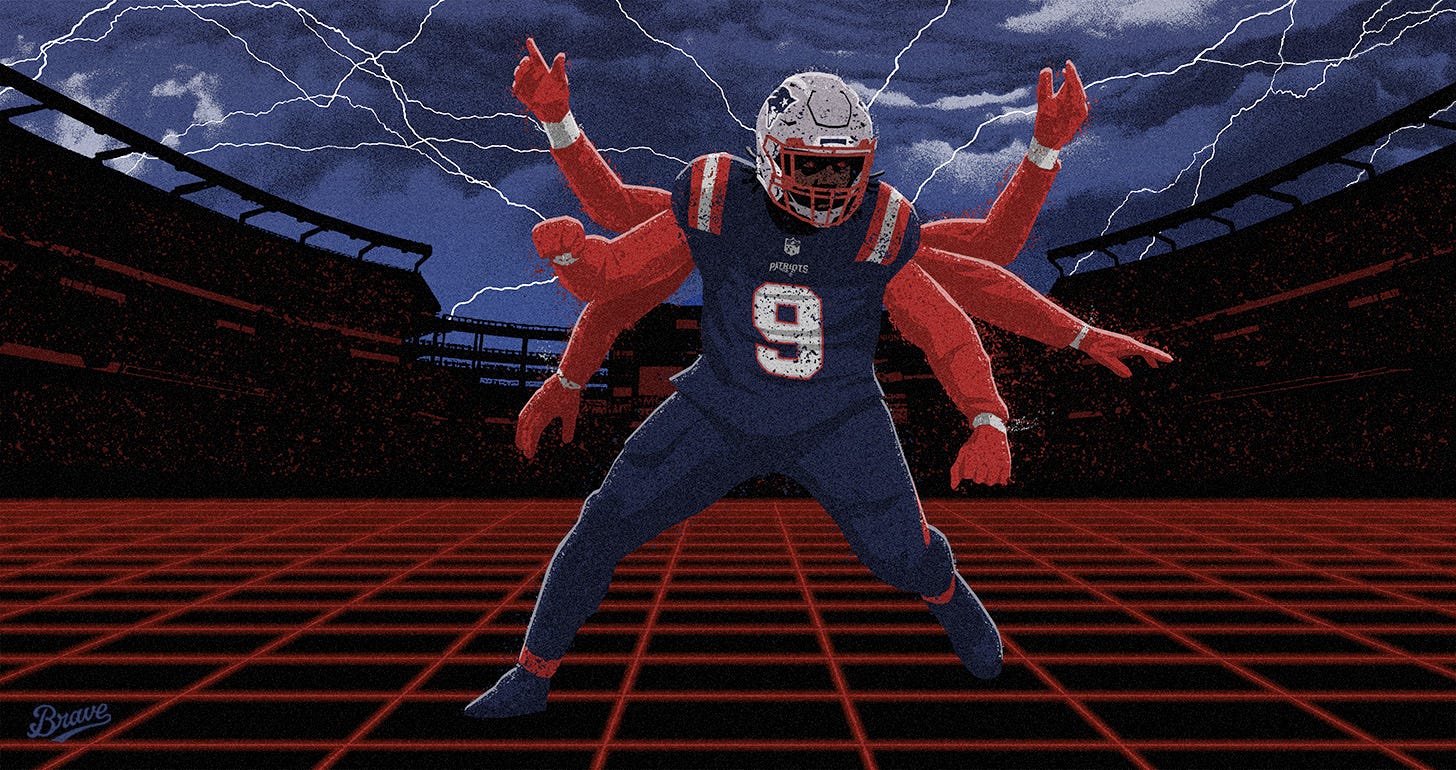


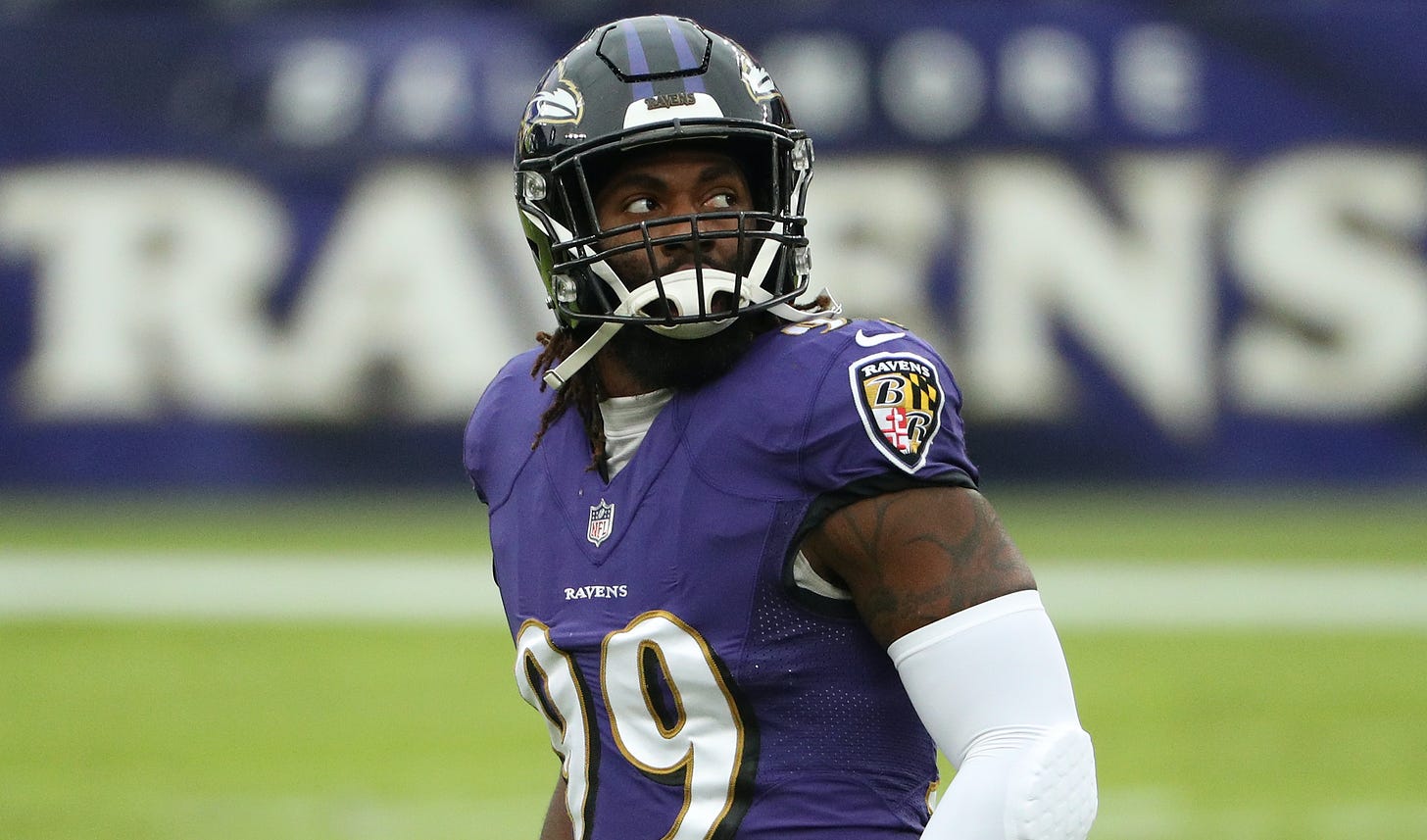
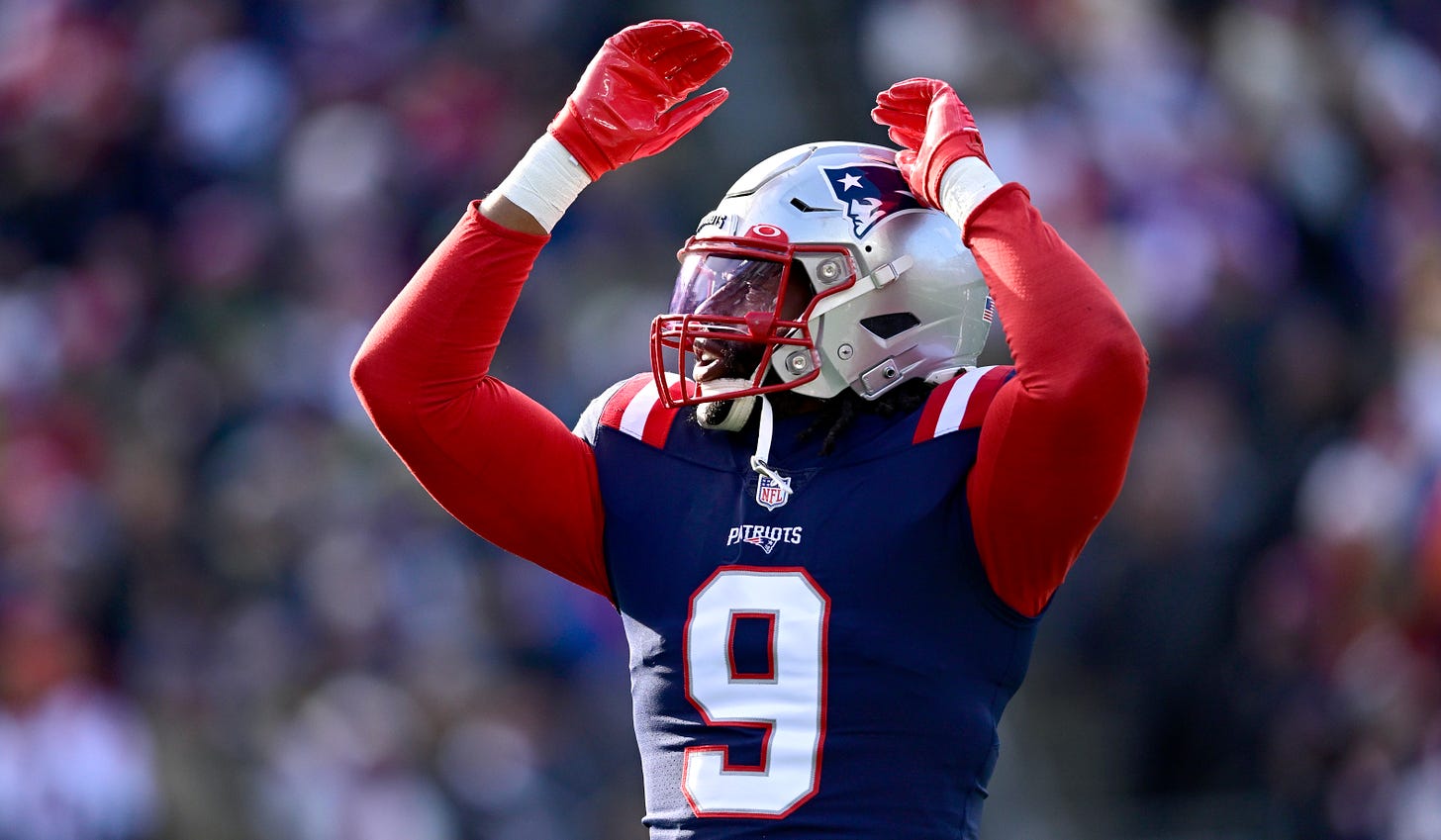

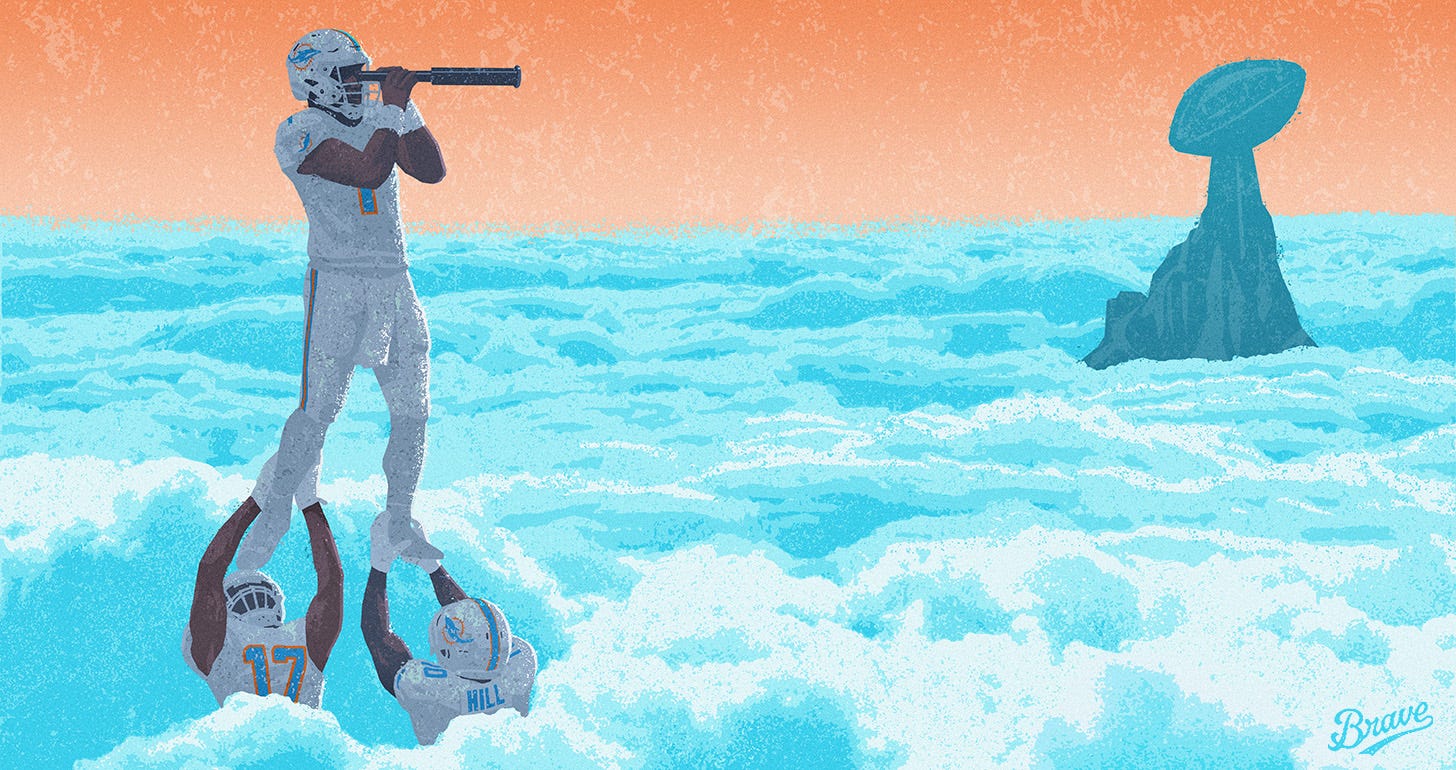





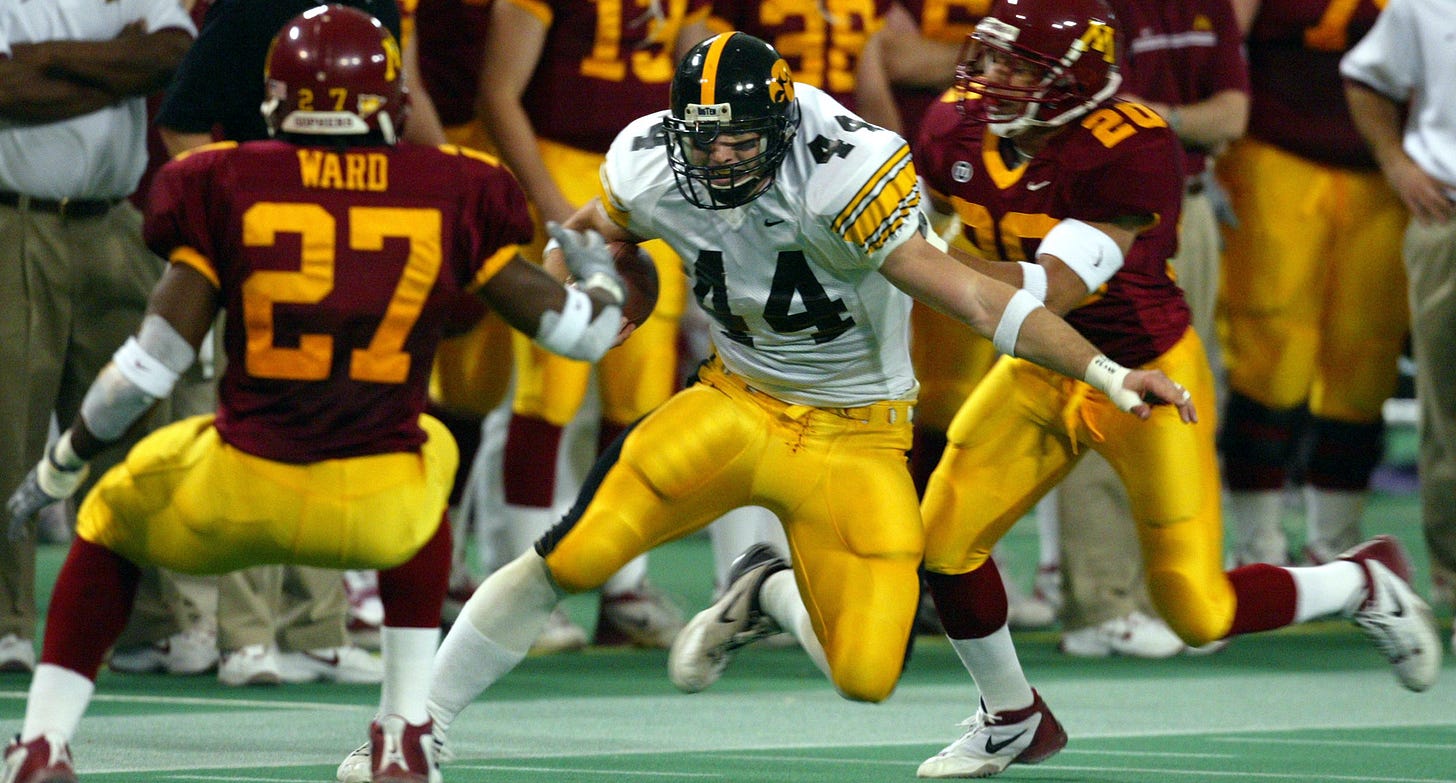





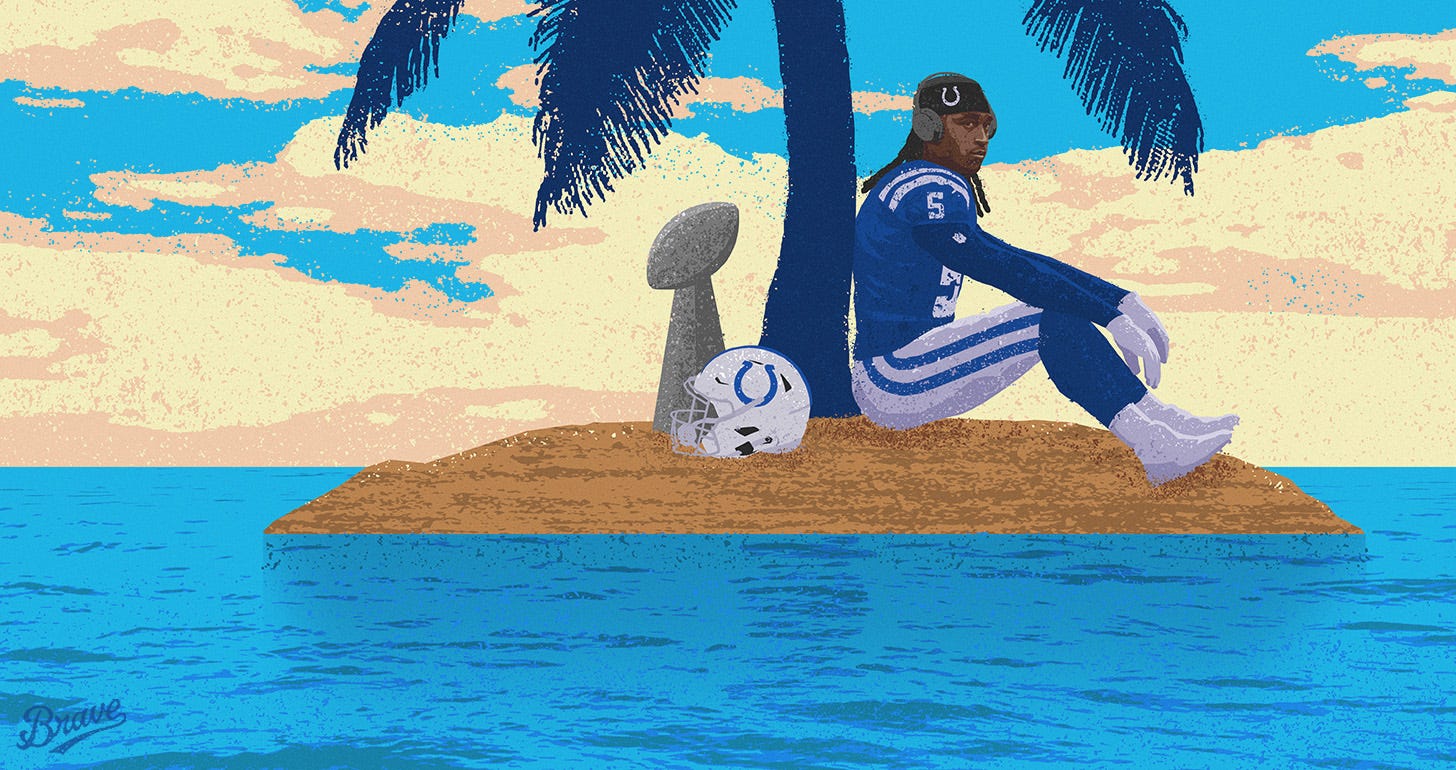



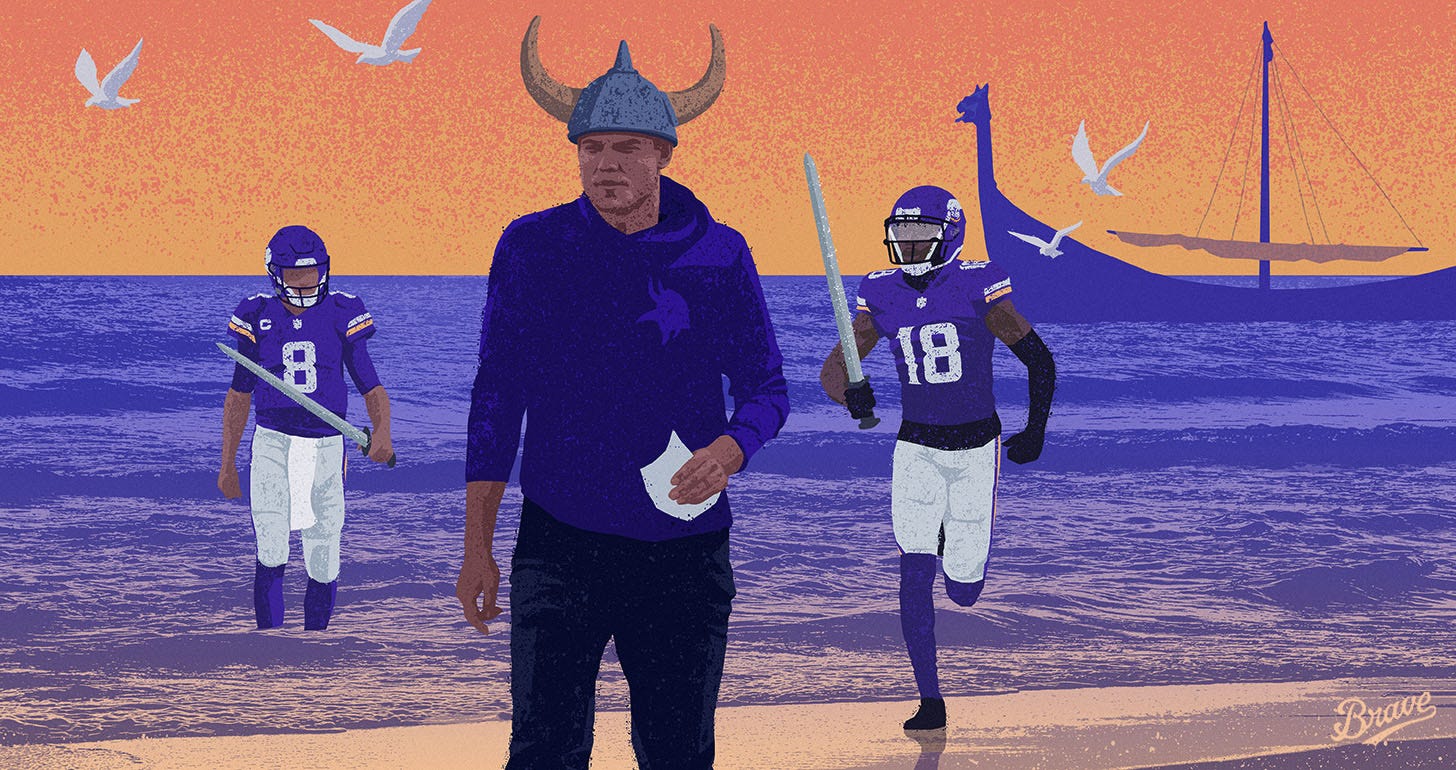
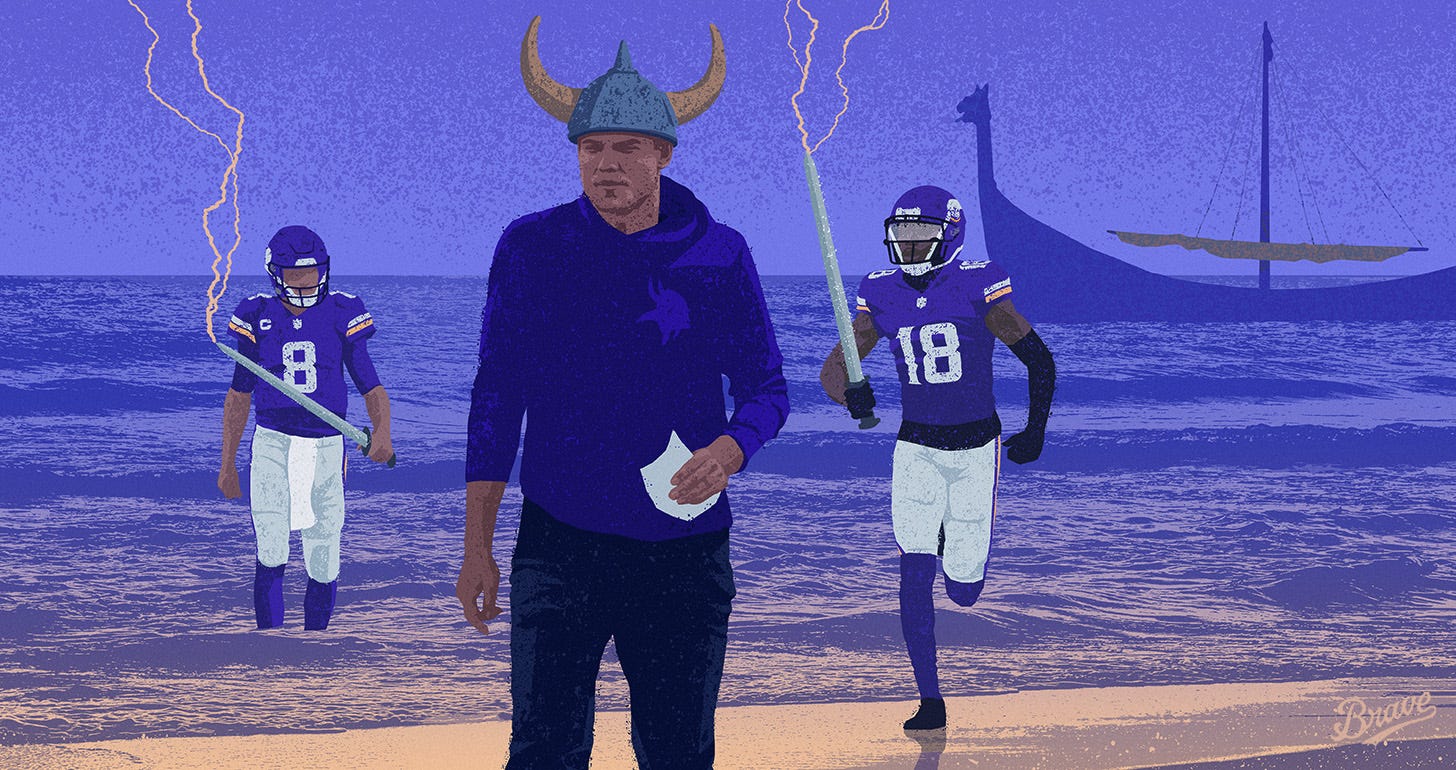




Love it!